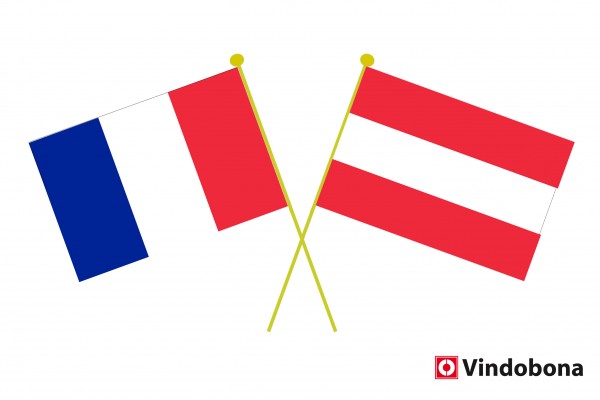French Ambassador Peyraud Strengthens Relations in Salzburg and Klagenfurt
Ambassador Matthieu Peyraud of the Republic of France to Austria made two important visits to the provinces of Salzburg and Carinthia in the fall of 2025 to further deepen political, economic, and cultural ties between France and Austria. The focus of the visits was on the region's economic potential and on opportunities to strengthen cooperation between Carinthia and Salzburg with France. These efforts by France and Austria to strengthen their bilateral relations were also initiated by a French Senate delegation's visit to Vienna, and France's interest in the “Vienna model” of social housing is also growing.
 The ambassador's travels underscore France's ongoing commitment to strengthening its presence and partnerships beyond Vienna in the Austrian provinces. / Picture: © French and Austrian crossed flags by Vindobona
The ambassador's travels underscore France's ongoing commitment to strengthening its presence and partnerships beyond Vienna in the Austrian provinces. / Picture: © French and Austrian crossed flags by Vindobona
The trips, which were marked by high-level meetings and exchanges with the French-Austrian community, underscore the growing interest in stronger bilateral cooperation.
Exchange in Salzburg
The ambassador's visit focused on Salzburg. Accompanied by Consul Clarisse Levasseur and Investment Officer Arianna Olivero (Business France Austria), Ambassador Peyraud met with representatives of Austrian companies with strong ties to France. A key highlight was the visit to Kronospan, a leading Austrian manufacturer of wood-based panels. The company, considered a “hidden champion,” has made significant investments in the Bourgogne-Franche-Comté region of France and plans to expand its presence in Paris. This signals great confidence in the dynamic potential of the French market. Austrian investments in France, including the takeover by Kronospan, are highlighted positively by the French Embassy.
The program also included a visit to the management team at Red Bull, whose development in France is described as “rapid.” The day concluded with a tour of the iconic Hangar 7 in Salzburg. Red Bull's expansion in France also includes the sports sector; there have been reports of the group's possible entry into the French second division soccer club Paris FC. The day also included a meeting with Dr. Peter Lechenauer, France's honorary consul in Salzburg, who is responsible for looking after French citizens, as well as an exchange with members of the “Cultures Francophones” association, an important promoter of French culture and language in Mozart's city.
Exchange in Carinthia
Another important stop was Klagenfurt, where Ambassador Peyraud was also a guest. Accompanied by the French Honorary Consul in Carinthia, Otmar Petschnig, the ambassador met with Mayor Christian Scheider and the President of the Carinthian Chamber of Commerce, Jürgen Mandl. The discussions focused on the political, economic, educational, and cultural challenges facing the region, as well as opportunities for strengthening cooperation between Carinthia and France. Finally, the ambassador met with members of the French-Austrian community in Klagenfurt for an informal exchange.
Visit to Vienna with a focus on sustainable living
A delegation from the French Senate, led by Dominique Estrosi Sassone, Chair of the Economic Affairs Committee, also visited the Austrian capital. The trip aimed to gain a better understanding of the Austrian model of social housing construction—in particular the Vienna model—in terms of its legal framework and concrete implementation. The senators, including Martine Berthet, Amel Gacquerre, and Franck Montaugé, were accompanied by the French ambassador to Austria, Matthieu Peyraud.
On the first day, talks were held at the Federal Ministry of Economic Affairs and then at Vienna City Hall. Here, the senators exchanged views with experts in Austrian social housing construction in order to analyze how the model works and its special features. The afternoon was devoted to practical illustration, as the delegation visited the Reumannhof municipal housing complex in Vienna's 5th district. Built in 1924/26, this municipal housing complex is an important architectural monument of “Red Vienna” during the interwar period and is considered the prototype of the “people's housing palace.”
The delegation also visited the new Wolfganggasse district in the 12th district. This area, which was built on the site of a former depot for the Badner Bahn railway, is seen as an example of sustainable urban planning and social diversity and comprises over 850 subsidized apartments (including municipal housing NEU and SMART apartments). The following day, the senators continued the dialogue in the Austrian Parliament and met with the chair and members of the National Council's Committee on “Buildings and Housing.”
The visits highlighted the quality of the dialogue and the shared desire of both countries to promote sustainable and accessible housing for all. With over 60 percent of its population living in subsidized or municipal apartments, the city of Vienna is considered an international role model in housing policy.



